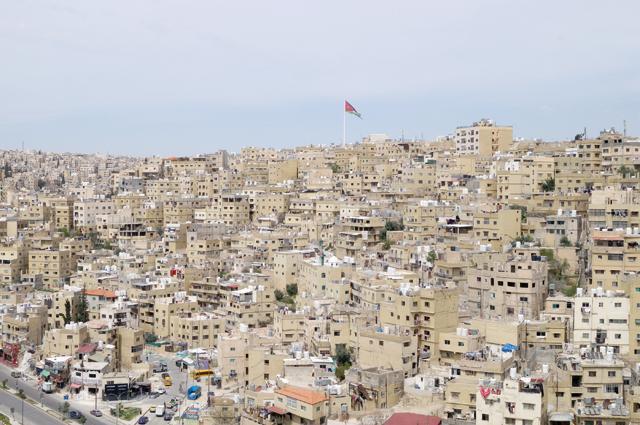You are here
Fitch ratings affirms Jordan’s stable outlook despite regional challenges
By Maria Weldali - Nov 11,2023 - Last updated at Nov 11,2023
AMMAN — Fitch ratings affirming Jordan’s long-term foreign-currency Issuer Default Rating (IDR) at “BB-“ with a stable outlook that is undeterred by regional instability, revealed the Kingdom’s record of maintaining economic and political stability, according to economists.
The “BB-“ rating reflects Jordan’s record of macroeconomic stability, robust fiscal and economic reforms and resilience in the financing and banking sectors, according to a statement issued by the Ministry of Finance, which said that “Despite the geopolitical situation… Jordan remains on a positive trajectory backed by a strong public pension fund and international support”.
Minister of Finance Mohamad Al-Ississ, in a statement said that “Jordan’s affirmed credit rating in light of the unstable regional circumstances is testament to our resilience. We will continue to attempt to safeguard the middle class against exogenous shocks, and avoid increasing the tax burden”.
The ministry pointed out that, the rating recognises Jordan’s reform-driven fiscal consolidation aimed to reduce the general government budget deficit, while forecasting a decline in the general government budget deficit to 2.2 per cent of Gross Domestic Product (GDP) in 2023 from 2.7 per cent in 2022, which reflects strong revenue performance and efficient expenditure.
The Kingdom’s ratings, however, are hindered by high government debt, anemic economic growth influenced by domestic and regional factors, in addition to the substantial current account deficit and net foreign debt that is higher than rating peers, according to Fitch Rating Action Commentary.
As for the escalating Israeli war on Gaza, Fitch noted that it has heightened geopolitical risks and uncertainties. While Jordan is not directly engaged, the expansion of the conflict could undermine the country’s growth prospects by amplifying the challenges associated with fiscal consolidation, Fitch affirmed.
“Jordan has a record of maintaining economic and political stability despite significant external shocks including social instability in the region [Arab Spring] and wars in neighbouring countries [Iraq and Syria], but these shocks have led to lower growth and significant government debt build-up.” according to Fitch website.
Fitch believes that Jordan having “successfully” completed its seventh review under the current Extended Fund Facility (EFF) with the International Monetary Fund (IMF), which is due to end in March 2024, and reaching a Staff-Level Agreement with the IMF for a new four-year EFF $1.2 billion, would help anchor the government’s fiscal consolidation strategy, targeting government debt of 80 per cent of GDP in 2028.
Noting that these developments would boost investor confidence and improve the competitiveness, efficiency and job generation — essential elements for supporting the recovery of the local economy.
For his part, Governor of the Central Bank of Jordan Adel Al Sharkas, affirmed that the stabilisation of Jordan’s credit rating and outlook serves as reassurance of the its capability to address challenges.
He pointed to the completion of the EFF’s seventh review in cooperation with the IMF, underscores Jordan’s solid macroeconomic foundations reinforced by stable monetary and exchange policies.
Sharkas highlighted Jordan’s ability to contain its inflation rates at around 2 per cent, its preservation of adequate levels of foreign currency reserves of over JD 17.4 million and low dollarisation (18 per cent of total deposits), showcases notable achievements.
Commenting on Jordan’s “BB-“ rating, economist Salameh Darawi, told The Jordan Times, that “Fitch ratings demonstrate Jordan’s commitment to achieving fiscal consolidation, and are a positive indicator of the country’s strong economic performance despite the unstable regional context”, noting that the EFF’s seventh review with the IMF, is another positive indicator which shows Jordan’s endeavour to overcome difficulties.
He noted that the current Israeli war on Gaza jeopardises a number of crucial sectors including the tourism and exports, therefore there is a need for inclusive economic agendas in order to mitigate such risks.
Economist Mazen Marji told The Jordan Times, that “such ratings do not demonstrate what happens on the ground. Rather they are only used to prove the success or failure of economic programmes”,
As for the evolving situation in the besieged strip, Marji said it would aggravate existing development challenges in Jordan, and heighten the country’s fragility due to being “the very first country to be impacted in case the situation worsens”,
Related Articles
AMMAN — Despite the regional turmoil, sovereign credit rating agency Fitch upheld the Kingdom’s rating at “BB-", affirming a stable ou
AMMAN — International credit rating agency Fitch Ratings on Wednesday upgraded Jordan’s credit outlook to stable, citing fiscal discipline a
AMMAN — On Friday, sovereign credit rating agency Standard & Poor’s (S&P) affirmed Jordan’s credit rating as B+/B with a stable outl
















